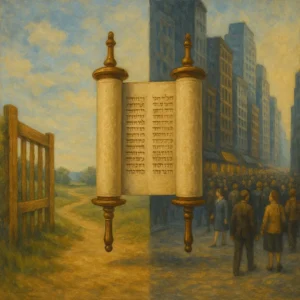Sacred Boundaries: A Message for a Casual Age
In Acharei Mot, Hashem instructs Moshe to speak to “Aharon your brother” following the death of Nadav and Avihu. Rabbi Goldberg notes the delicate phrasing, emphasizing that Aharon is not being excluded out of divine rejection but because the holiness of the space demands limits. This nuance is crucial in a time when modern culture prizes access, comfort, and informality. The Torah reminds us that sacredness depends on reverence — that closeness to God must be measured and mindful, not casual or presumptuous.
This message counters today’s impulse to over-personalize spirituality and erase all boundaries in the name of openness. Holiness, however, is sustained by differentiation — between sacred and profane, permissible and prohibited, the invited and the uninvited. The very structure of Yom Kippur, with its highly regulated entry into the Kodesh HaKodashim, reinforces this fundamental truth.
Hashem Dwells Even in Our Defilement
Despite these boundaries, Hashem’s presence remains accessible, even in our lowest moments. The verse “Who dwells with them amidst their impurity” becomes a cornerstone for Rav Soloveitchik’s reflection on divine compassion: God is not only a distant Father but also a nurturing Mother who stays with us, even when we feel spiritually soiled. This dual imagery communicates a powerful truth — no matter how far we fall, God does not abandon us.
In a world where failure often leads to alienation or self-loathing, the Torah offers reassurance: divine intimacy is not reserved for the perfect. Hashem is present even in our struggle, walking with us through darkness, not just light.
Don’t Go Backward: The Cultural Decline of a Technologically Advanced World
As Acharei Mot transitions to prohibitions related to sexual immorality, we are warned not to emulate Egypt — the most culturally advanced yet morally corrupt society of its time. Rabbi Goldberg emphasizes how timely this message is. While our generation experiences unprecedented scientific and technological advancement — artificial intelligence, medical innovation, space exploration — we are, paradoxically, regressing morally.
Basic definitions around identity, relationship, and integrity are being eroded. The Torah is clear: spiritual progress cannot coexist with moral confusion. “Do not go back to Egypt” is not only a geographic command but a cultural one — a charge to resist moral relativism, even when it is cloaked in progress.
Kedoshim Tihyu: Holiness as Identity
Kedoshim begins with the imperative: “You shall be holy, for I, Hashem your God, am holy.” This is not a demand for perfection but a reminder of our divine DNA. Holiness is not an abstraction — it is meant to shape every part of life: our business dealings, family structure, private behavior, and how we view others.
Rabbi Goldberg stresses that holiness is not about escaping the world but elevating it. Even as society celebrates fluidity and deconstructs boundaries, the Torah asserts that some structures must remain firm. In particular, the sexual prohibitions and ethical mandates of this parsha serve as the bedrock for a community rooted in dignity, order, and identity.
In this age of individualism and redefinition, Kedoshim reaffirms a countercultural truth: we are not only free to choose — we are obligated to choose well, to protect what is sacred, and to be vigilant against the slow erosion of moral clarity.
Compassionate Judgment in a Complex World
The parsha also calls on us to judge others “with righteousness.” This is not legalistic; it is profoundly human. Rabbi Goldberg urges us to recognize that every person carries unseen burdens — health struggles, emotional pain, and internal conflict. In an era where quick judgment is the norm, the Torah demands empathy and restraint. If we judge others with nuance and mercy, Hashem will judge us the same way.

